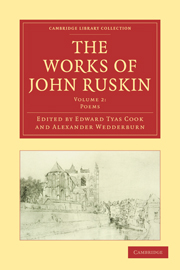Book contents
PART III - VERSES WRITTEN IN BOYHOOD (1826–36)
Published online by Cambridge University Press: 05 August 2011
Summary
There is always a peculiar interest in watching development, in witnessing growth. When we have seen a plant burst the soil, and its long-expected bud unfold into blossom, we love every leaf and petal of it: it is our own; and worth more to us than all the cut bouquets of a flower-show. And in the same way we delight in the early history of nations,—in the early biography of great men. As we follow their first steps, and note the foreshadowings of character, the promises of power, which even their youngest years afford, they become our own by sympathy: and when they reach the day of victory and coronation, we seem, like loyal adherents of a conqueror, to share the triumph; and, like intimate confidants, to understand the full significance of the achievement.
It is no idle curiosity, then, that prompts the admirers of Mr. Ruskin's works to collect his boyish writings and to learn the story of his youth. More than other writers, he is misunderstood by the casual reader: more than others, he needs to be approached—I do not say with any prejudice in his favour—but with a preliminary understanding of his ways, and aims, and attitude: and in his case, more than with others, these conditions have been determined at an early age, and illustrated in his early writings.
- Type
- Chapter
- Information
- The Works of John Ruskin , pp. 251 - 473Publisher: Cambridge University PressPrint publication year: 2010First published in: 1903

